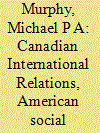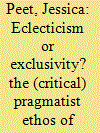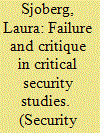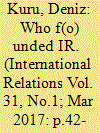| Srl | Item |
| 1 |
ID:
174043


|
|
|
|
|
| Summary/Abstract |
The last two decades have witnessed growing attention to the “Canadianization” of the field of International Relations. In this article, we forward a novel approach to testing the influence of domestic factors in Canadian International Relations. By analyzing the reading lists of comprehensive examinations from Canadian doctoral programs in International Relations, we can understand the ways in which Canadian institutions’ reading lists construct the hierarchy of the field’s journals. Among these journals, those based in the United States are most frequently assigned, with others hosted in the UK and around Europe. Canadian journals are rarely assigned to reading lists. French-language journals are also rarely assigned to reading lists, even in francophone institutions, and when they are, the journals are much more likely to be hosted in France than in Canada. We offer a series of guiding questions for future consideration of the “Canadianization” of International Relations education in Canada.
|
|
|
|
|
|
|
|
|
|
|
|
|
|
|
|
| 2 |
ID:
175157


|
|
|
|
|
| Summary/Abstract |
Eclecticism in International Relations (IR) claims to reject the rigid boundaries set by various theoretical traditions, yet, in practice, it falls short of moving the field “beyond paradigms” and tends to produce analytical exclusivity rather than eclecticism. This exclusivity is the result of Sil and Katzenstein’s investment in tenets of American pragmatism. These tenets favor consensus and universalism, leading to the reproduction and exclusivity of the theoretical status quo. Dissolving paradigmatic boundaries requires a more critical form of pragmatism. Drawing on the common origins of feminism and pragmatism paired with the contemporary feminist concept of intersectionality, this essay proposes a critical pragmatist ethos and an intersectional analytic eclecticism. This can produce a more inclusive form of analytic eclecticism and render visible the power dynamics that shape experiences as well as academic scholarship. Only when analytic eclecticism is informed by intersectionality and a critical pragmatism might it actually move IR “beyond paradigms.”
|
|
|
|
|
|
|
|
|
|
|
|
|
|
|
|
| 3 |
ID:
164287


|
|
|
|
|
| Summary/Abstract |
Debates imitates scholarship, which imitates debate. Using perspectives from both my policy debate career and my research career, this article argues that the enterprise of critique, whether in critical security studies or elsewhere, is always and already failing and failed. It proceeds in four sections. The first section sets up my entry into the problems of/with critique. The second section analyzes the types of dissonances inherent in the production of critical security studies scholarship. The third section theorizes those dissonances as failures – arguing that failure itself is a part of in and of critical security studies. The conclusion discusses where to go from, during, and in a world of failed critique in critical security studies.
|
|
|
|
|
|
|
|
|
|
|
|
|
|
|
|
| 4 |
ID:
152335


|
|
|
|
|
| Summary/Abstract |
This article aims to present a history of International Relations (IR) that looks at the role of three big American foundations (Carnegie Endowment for International Peace, Rockefeller, and Ford foundations) in the development of IR as an academic field in continental Europe. Its framework goes beyond the usual disciplinary history narratives that focus on IR’s US or UK trajectories, pointing instead to American foundations’ interwar and early post–World War II influence on French and German IR. The cases emphasize US foundations’ interactions with European scholars and international scholarly organizations as major factors shaping IR’s developmental pathways. This study offers a way to consider foundations’ role in IR’s gradual academic institutionalization by connecting disciplinary historical approaches to disciplinary sociology. Its sociologically conscious position underlines the significance of American philanthropies in a historical narrative and recognizes the relevance of transnational dynamics by going beyond usual emphases on ideas and national contexts.
|
|
|
|
|
|
|
|
|
|
|
|
|
|
|
|